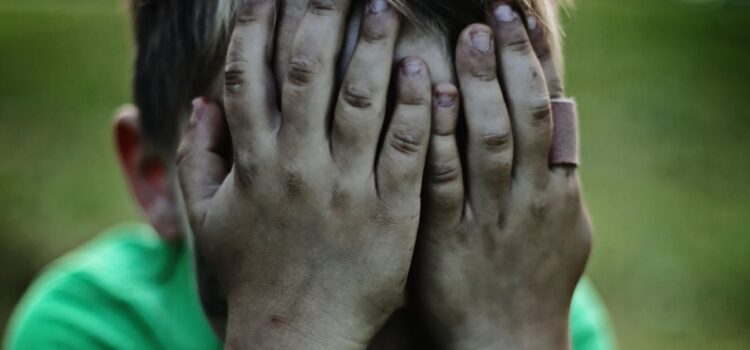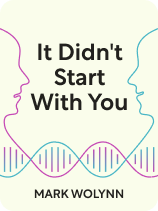

This article is an excerpt from the Shortform book guide to "It Didn't Start With You" by Mark Wolynn. Shortform has the world's best summaries and analyses of books you should be reading.
Like this article? Sign up for a free trial here .
What causes childhood trauma? Can parents genetically pass down their trauma to children?
According to scientists, childhood trauma can be biological, passing from generation to generation. In addition, a child’s upbringing and relationship with parents can cause emotional distress in adulthood.
Here’s how we inherit trauma, according to Mark Wolynn.
How We Inherit Trauma
Cellular biologists have demonstrated that environmental influences—including our mother’s behaviors, thoughts, and beliefs—shape us physically and emotionally from the moment of conception. These influences biologically program us to respond to our environment in certain ways.
Scientists can now identify specific genes that are linked with particular emotional states, such as heightened depression and anxiety. Wolynn says we know that which genes get activated determines how we respond to stressors. If your mother experiences high, sustained stress during pregnancy, those stress hormones get passed along, which causes the same stress pattern in you. This could be a good thing—for example, if it prepares you to adapt and survive in a dangerous environment, like a high-crime neighborhood. Alternatively, it could be maladaptive. You could enter the world on high alert and overly sensitive, even when you’re surrounded by love, support, and safety, putting you out of sync with reality.
Many studies now reveal that children of parents who lived through traumatic events—such as the 9/11 attacks in New York City or the Holocaust during World War II—display gene expression and stress patterns similar to those of their parents, even though they didn’t directly experience the trauma. Control groups confirm the uniqueness of these findings. Although scientists haven’t yet isolated the exact mechanisms responsible for this biological transmission of trauma from parent to child, Wolynn says, animal studies indicate that biological markers of trauma can be passed down through at least three generations.
New Research on the Role Genes Play in Trauma Symptoms
Whereas Wolynn asserts that genes influence whether someone manifests trauma symptoms, he doesn’t specify how much influence genes have in causing childhood trauma. Let’s look at what causes childhood trauma, according to research.
According to studies conducted on twins, genetic factors do not cause all differences in trauma response. Rather, they account for about a third of the variation between those who exhibit trauma symptoms and those who don’t. Other research completed after the publication of Wolynn’s book shows mixed results. Studies conducted on children of trauma survivors sometimes revealed no differences between trauma survivors’ offspring and controls in terms of their susceptibility to trauma symptoms. Therefore, we cannot assume that just because a child has parents who endured severe trauma, the child will have a predisposition to trauma symptoms.
Given these mixed results, some researchers are looking at non-genetic factors to explain trauma symptoms, such as a family’s socio-cultural milieu and different communication styles of trauma survivors that shape children’s ability to manage stress.
Trauma From Parents
Different relationship dynamics with parents can initiate or continue a cycle of suffering in our families, according to Wolynn. Parents play the most important role in our ability to adapt, form healthy relationships, and thrive. Wolynn acknowledges that there are no known factors that definitively predict how relationship dynamics affect us. Yet he notes that factors such as birth order and gender can influence our mental health outcomes.
Wolynn argues that you will not be able to achieve true peace or freedom until you mend relationships with your parents, as these are defining relationships that form the model upon which you build all other relationships in your life.
For example, if you experienced your father as depressed, angry, and unavailable, you might unconsciously choose a partner with those same tendencies. That childhood trauma causes you to commiserate with your mother by sharing the frustration and emotional angst that she experiences in her marriage. In the process of mending your relationship with your father, you might discover that his father was physically abusive toward him, and your father suffered in silence until he could escape. That background knowledge, Wolynn says, might give you a broader context for understanding and accepting your dad, thereby supporting your healing.
Even “Good” Parents Can Cause Pain
Wolynn discusses the pain and emotional damage abusive parents can cause their children, but he doesn’t address whether and how non-abusive parents might negatively influence their children. Let’s explore this briefly.
According to research, even “good” parents who provide support and love can inadvertently contribute to our difficulties in forming healthy relationships. Their protection and support may not prepare us for hurtful, challenging experiences in the real world. Then, when we encounter criticism or hardship, we don’t know how to respond. This can cause us to feel frustrated, confused, and angry, which we might resentfully direct toward our parents.
Also, our parents’ loving, seemingly “perfect” relationship may give us an impossible standard against which we measure ourselves and any relationships we pursue. This can cause us to avoid trying to establish a satisfying intimate relationship because we think we will inevitably fall short of our parents’ relationship model.
So, regardless of how well our parents raise us, they shape our views and behaviors in some fashion. Their influence commonly shows up, for example, in the way we feel about our bodies, how much we trust others, and the extent to which we strive to please others.
Factors That Influence Whether We Internalize Parents’ Negative Emotions
According to research, last-born children have a lower risk of mental health problems than both middle-born and first-born children. One key reason is that last-born children are in the most advantageous position to benefit from the guidance of older siblings, which equips them with skills that reduce trauma symptoms.
How do parenting practices come into play? Perhaps surprisingly, studies indicate that there are only small links between parenting behaviors and their impact on children’s stress responses. Two parenting behaviors that seem to cause childhood trauma are delivering more punishment and offering less reassurance when children resist feared behaviors. Factors that do not significantly affect a child’s internalizing tendencies include force (when parents push a child to engage in a feared behavior), positive reinforcement (when parents reward a child for engaging in a feared behavior), and dependency reinforcement (when parents let a child avoid a feared situation).

———End of Preview———
Like what you just read? Read the rest of the world's best book summary and analysis of Mark Wolynn's "It Didn't Start With You" at Shortform .
Here's what you'll find in our full It Didn't Start With You summary :
- A look into the causes of persistent anxiety, depression, and illness
- How the traumas of your past are stopping you from being truly happy and free
- How to resolve deeply-rooted trauma by applying a unique therapeutic approach






